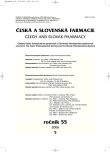-
Medical journals
- Career
Plant Metabolites as Nootropics and Cognitives
Authors: F. Červenka; L. Jahodář
Authors‘ workplace: Univerzita Karlova v Praze, Farmaceutická fakulta v Hradci Králové, Katedra farmaceutické botaniky a ekologie
Published in: Čes. slov. Farm., 2006; 55, 219-229
Category: Review Articles
Overview
Nowadays several millions of people suffer from Alzheimer’s disease and other types of dementia. Etiology of these diseases is not known very well. There occur different levels of neurotransmitters, the level of acetylcholine in the brain is decreased and pathological changes affect the brain tissue. Organic and toxic damage of the brain, free radicals, and other changes participate in the development of these diseases. Drugs as nootropics, cognitives, and neuroprotectives are commonly used to treat these diseases. Some of these drugs have often side and undesirable effects. In recent years some natural substances (galanthamine, huperzine A, vinpocetine), and standardized plant extracts (Ginkgo biloba L., Centella asiatica L.) Urban, Bacopa monniera L., Evolvulus alsinoides L.) are often used. These plant preparations produce fewer undesirable effects and the same effectiveness as the classic therapy, or these preparations are used as a supplement to the classic therapy.
Key words:
plant metabolites – cognitives – nootropics – neuroprotectives – free radicals
Labels
Pharmacy Clinical pharmacology
Article was published inCzech and Slovak Pharmacy

2006 Issue 5-
All articles in this issue
- New Systems for Colonic Drug Targeting
- Some Possibilities of Using Spectrometry in the Near Infrared Region in Drug Quality Control
- Radionuclide X-ray Fluorescence as an Alternative Method to Pharmacopeial Tests for Heavy Metals
- Plant Metabolites as Nootropics and Cognitives
- A Comparison of Inhalatory Beta2-Mimetics with Long-Term Action (Formoterol vs. Salmeterol)
- Studies of the Properties of Tablets Made from Directly Compressible Starch and Its Mixtures with Directly Compressible Lactose
- Flavonoids – Main Constituents of the Leaves of Holodiscus discolor (Pursh) Maxim.
- Czech and Slovak Pharmacy
- Journal archive
- Current issue
- Online only
- About the journal
Most read in this issue- Plant Metabolites as Nootropics and Cognitives
- A Comparison of Inhalatory Beta2-Mimetics with Long-Term Action (Formoterol vs. Salmeterol)
- New Systems for Colonic Drug Targeting
- Flavonoids – Main Constituents of the Leaves of Holodiscus discolor (Pursh) Maxim.
Login#ADS_BOTTOM_SCRIPTS#Forgotten passwordEnter the email address that you registered with. We will send you instructions on how to set a new password.
- Career

